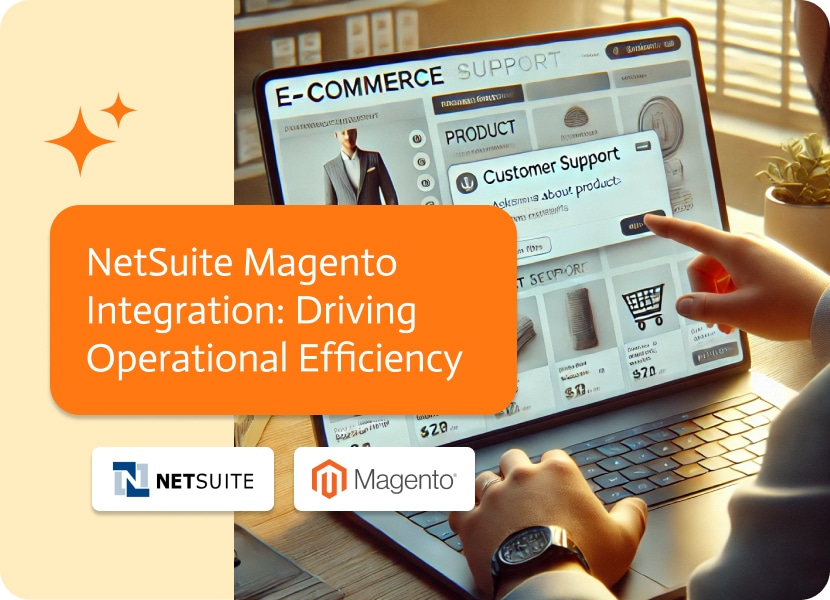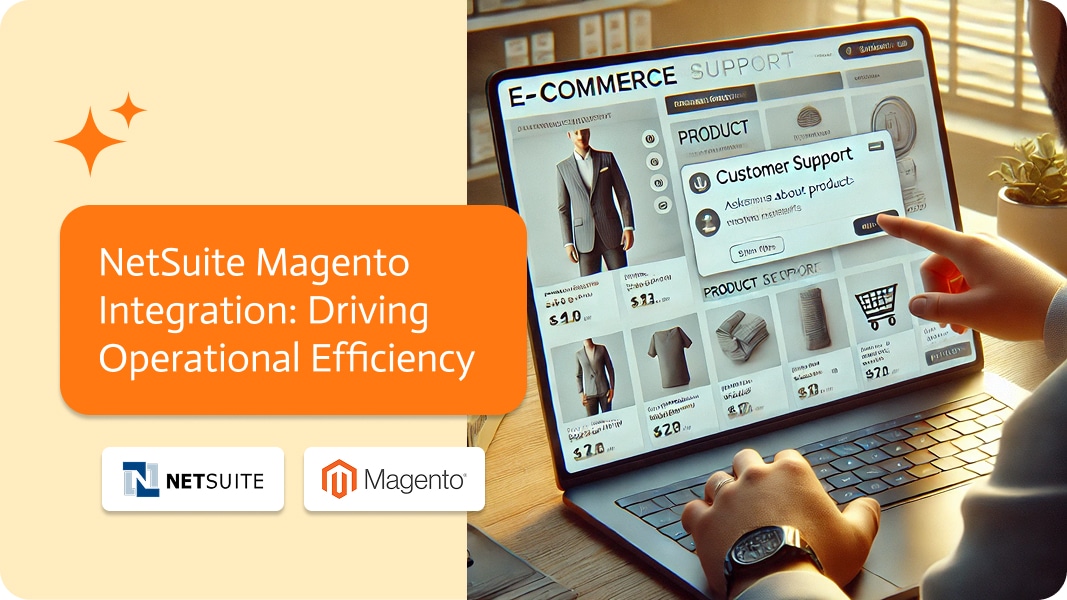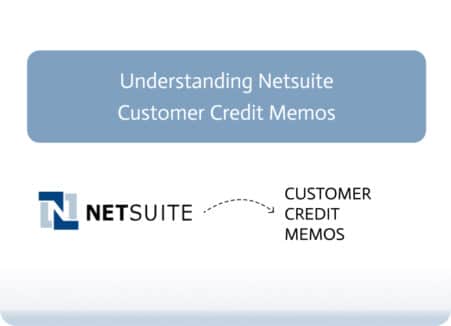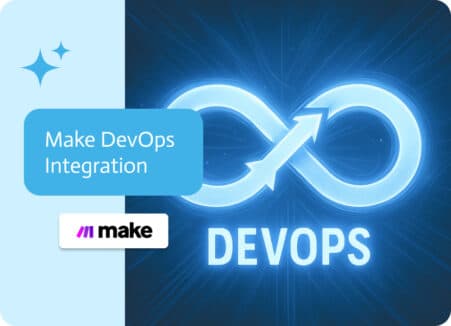

NetSuite Magento Integration: Driving Operational Efficiency
NetSuite Magento Integration connects NetSuite’s powerful ERP capabilities with Magento’s versatile eCommerce platform. For eCommerce businesses, this integration means real-time data sharing, automated backend processes, and smoother customer experiences. It enhances inventory and financial management while streamlining workflows, reducing manual errors, and keeping up with customer demand.
This article explores the key benefits, unique use cases, and tips for setting up the integration with an iPaaS solution like Noca AI. This guide provides businesses with insights to navigate challenges and unlock the full potential of their ERP and eCommerce systems.
Key Benefits of NetSuite Magento Integration
- Real-Time Data Synchronization
Real-time data updates ensure all departments stay informed. By synchronizing customer, inventory, and order data across systems, businesses reduce manual entry needs and lower error risks. This accuracy supports faster, data-driven decisions. - Enhanced Inventory Management
Real-time inventory visibility helps businesses avoid overstocking or stockouts. This integration allows companies to manage ideal stock levels, cutting costs and improving cash flow. - Improved Order Management and Fulfillment
Automated workflows simplify order processing, reducing delays. Orders are handled accurately and efficiently, meeting customer expectations even during high-demand periods. This leads to higher customer satisfaction and a smooth operational flow. - Better Financial Oversight
By linking Magento eCommerce transactions directly to NetSuite ERP, businesses gain better control over revenue, expenses, and profitability. This integration simplifies financial reporting, enabling smarter decisions and efficient financial management.
Key Use Cases of NetSuite Magento Integration
1. Inventory Optimization for Seasonal Sales Surges
E-commerce businesses, especially those in retail and fashion, face seasonal shifts in inventory demand. NetSuite Magento Integration provides real-time inventory management, allowing companies to prepare effectively for high-demand seasons while avoiding overstocking.
For example, a clothing retailer leverages NetSuite with Magento to manage inventory during holiday shopping periods. As customer orders increase, real-time data updates ensure inventory levels across systems are in sync. This avoids overselling and enhances the customer’s shopping experience. Additionally, automated reordering in NetSuite ensures popular items are restocked, keeping sales opportunities open.
The integration also supports detailed reporting and analysis, helping companies forecast demand based on previous sales trends. This proactive approach keeps stock levels optimal, improving cash flow and customer satisfaction.
2. Streamlined Order Processing and Fulfillment for Fast-Moving Consumer Goods (FMCG)
Companies in the FMCG sector need rapid order processing and fulfillment to meet high customer demands. NetSuite Magento Integration enables a seamless order-to-fulfillment process, speeding up each order and improving accuracy.
Imagine a grocery store that specializes in organic and artisanal items. By connecting NetSuite and Magento, the store can sync orders instantly, centralizing inventory and order management. Customers benefit from real-time order tracking, enhancing transparency and trust.
In the back office, automation reduces the need for manual work, minimizing error risks. Real-time inventory tracking allows the store to adjust its stock levels efficiently, preventing stockouts and ensuring prompt order fulfillment. This streamlined workflow enables the store to handle higher order volumes while maintaining excellent service standards.
3. Enhanced Customer Insights for Personalized Marketing in Luxury Goods
Luxury retailers rely on a personalized approach to engage customers and build loyalty. NetSuite Magento Integration allows luxury brands to create detailed customer profiles, which capture buying patterns, preferences, and special requests for a tailored experience.
For instance, a luxury fashion brand analyzes customer purchase history, preferences, and browsing behavior. The integration provides these insights, helping the brand identify top-performing products, high-value customers, and trends in consumer choices. Marketing campaigns can be customized to align with these insights, such as exclusive previews or loyalty discounts to encourage repeat purchases.
With unified data, the brand can also enhance product recommendations, aligning marketing efforts with specific customer interests. This personalized approach not only increases customer satisfaction but also drives incremental sales, reinforcing the brand’s reputation for customer-centered service in the competitive luxury market.
Setting Up NetSuite Magento Integration Using an iPaaS
For many companies, setting up NetSuite Magento Integration can be challenging, especially when they need seamless data exchange between ERP and eCommerce systems. While native integration options exist, most companies find them restrictive. Many turn to iPaaS platforms, such as Noca AI, for a flexible and scalable solution.
An iPaaS like Noca AI simplifies integration by offering pre-built connectors, automated workflows, and customizable features. Businesses can easily configure and adjust their integration without extensive coding or technical expertise. iPaaS solutions also provide monitoring tools to ensure data accuracy and quick issue resolution. By choosing Noca AI, companies can enjoy several benefits:
- Scalability: As the company grows, they can expand the integration without needing to overhaul the system.
- Customization: iPaaS allows companies to adjust workflows to meet their unique needs.
- Data Security: iPaaS providers implement strong data security measures, ensuring safe handling of sensitive customer and financial data.
iPaaS platforms offer flexibility and efficiency that make them an ideal choice for companies seeking to support long-term growth and manage complex integrations.
Conclusion
Integrating NetSuite with Magento is not just a technical setup but a strategic step for eCommerce businesses. It enables smoother operations, improved customer experiences, and effective scaling. Real-time data synchronization, automated workflows, and centralized management streamline inventory and order management, boosting efficiency and customer satisfaction.
Choosing the right integration approach, especially through an iPaaS like Noca AI, reduces complexity and offers a practical, future-proof solution. With a focus on scalability, customization, and robust support, iPaaS platforms help companies optimize operations and deliver exceptional customer service, positioning them for success in a competitive eCommerce landscape.
Q&A: NetSuite Magento Integration
Q1: Can NetSuite Magento Integration support multiple eCommerce platforms?
Yes, while the integration focuses on Magento, businesses can often expand to include additional platforms. An iPaaS can provide the scalability needed for multi-platform integration.
Q2: How much customization does NetSuite Magento Integration allow?
The level of customization depends on the chosen integration method. Custom-built solutions offer maximum flexibility, while iPaaS solutions provide configurable workflows tailored to business needs.
Q3: What data security measures protect NetSuite Magento Integration?
Data security is crucial, especially with sensitive financial and customer data. iPaaS platforms include advanced security features that protect data exchanges.
Q4: How long is the typical implementation time for NetSuite Magento Integration?
Implementation times vary based on business needs and the complexity of setup. Generally, iPaaS solutions implement faster than custom-built integrations.
Q5: Is it possible to integrate NetSuite with other applications besides Magento?
Yes, NetSuite integrates well with other eCommerce, CRM, and financial platforms, making it a versatile choice for businesses needing multi-platform integration.


